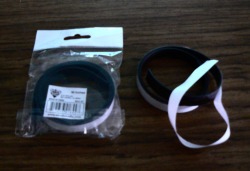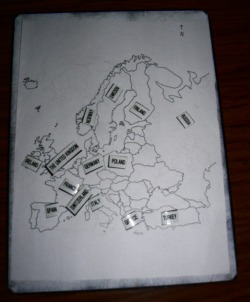So, here's a question you really didn't want to think about:
What is technology?
Okay, if that one's too hard, how about this one:
What is good technology?
That's probably a bit easier to answer.
A good working definition of good technology is probably something like "finding the right tool for a job". Sometimes that involves cables and patches and upgrades, but sometimes it is startlingly simple.

We have a boy in the 8th grade who has been very frustrated in my Social Studies class. Let's call him Peter Brady.
Peter is not a high achiever in most academic areas. He doesn't process information very well and has trouble memorizing things. Each time I give a mapping quiz, he studies really hard and he always THINKS he's done really well, but he often ends up with single digit scores. We've tried modifying his tests, cutting back on the number of places he has to map, giving him a wordbank, etc.., but nothing has helped very much.
About a week ago, one of our classroom aides followed a hunch and cut a bunch of terms out of Peter's wordbank with a pair of scissors and asked him to physically place them on a blank map.
He did it with 90% accuracy within ten seconds.
The Special Ed team and I had a collective AHA! moment so intense it nearly blinded us.
Think about it like this:
Peter needs to look at a landmark on the map, think, "Hmmm, do I know this?", look over at his wordbank, decode the words on the wordbank, pick one, encode it, look at his test sheet, find the number that corresponds with the landmark, decode the term again, and write it down, more or less correctly and legibly.
Of course he was having problems.
By cutting out the wordbank and having him do everything visually/spacially, we tapped a whole different set of skills.
We've taken this concept a step further.

I went to a craft store and bought a few flexible magnetic strips - the kind that they make into the instant poems you find on people's refrigerators. They were in the sale bins at the front of the store for about $1.95 each.
Our Special Ed team used a label-maker to print various terms that I will be using on upcoming mapping quizzes, glued them to a magnetic strip and cut them to length.

We put a blank map on a mini magnetic whiteboard (though even a cookie sheet would work) and BLAMMO! - we've got an instant, reusable testing setup for visual learners.
We've tested this out on Peter and it works great. Our next step is to try it out on a few other learners with special needs who have consistantly had the same kind of problems.
I feel good. The Special Ed team feels good. Peter feels good. For all I know, the magnets feel good.
Maybe, on the giant teacher spreadsheet in the sky, this balances out those tests I handed back to my students last week without writing the grades in my gradebook. Sigh...
 RSS Feed
RSS Feed